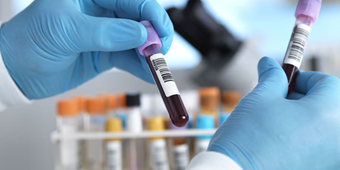- Cardiology And Vascular Health
- Health Topics
- Heart And Vascular Disease Prevention
- Heart Disease Risk Factors
- Heart Health
- Menopause
- Stroke
- Uniquely Female
How To Beat Metabolic Syndrome

Find Your Perfect Match
Answer a few questions and we'll provide you with a list of primary care providers that best fit your needs.
It’s common knowledge that overeating, being obese, and being physically inactive are bad for your health. In fact, they put you at risk for metabolic syndrome, heart disease, and other health problems.
Metabolic syndrome is a disease of the way the body uses and stores its energy. Glucose is the source of fuel for our bodies, and people with metabolic syndrome can’t use that fuel efficiently or effectively.
Metabolic syndrome, which affects up to 35 percent of American adults, is a serious health condition defined by a group of five risk factors that can lead to coronary artery disease, stroke, and diabetes. If you have three or more of the following risk factors, you have metabolic syndrome:
- Central obesity, meaning your waistline measures more than 35 inches for woman or 40 inches for men.
- High triglycerides in the blood that measure 150 mg/dL or more when you have a fasting blood test. If you are taking medicine for high triglycerides, it’s also a risk factor.
- Low HDL (good) cholesterol, with levels less than 50 mg/dL for women or less than 40 mg/dL for men, as measured by a blood test. Taking medicine for low HDL cholesterol is also a risk factor.
- High blood pressure measuring 130/85 mm Hg or higher — or taking medicine for high blood pressure.
- High blood glucose (sugar), measuring 100 mg/dL or more when you have a fasting glucose blood test — or you are taking medicine for high blood glucose.
Are There Symptoms?
The syndrome doesn’t have specific symptoms, but there are signs associated with the five risk factors that may show up, such as high blood pressure, high cholesterol or high blood sugar.
The best treatment is intervention before you get metabolic syndrome by exercising and watching what you eat so you don’t have to worry about it down the road.
Symptoms related to metabolic syndrome risk factors will tip off your provider to help you get looked at and possibly diagnosed.
How Metabolic Syndrome Is Linked To Heart Disease
The more metabolic syndrome risk factors you have, the more likely you are to develop heart disease or have a stroke. High cholesterol levels can lead to plaques building up in your artery walls, and high blood pressure can make your heart work harder and strain your blood vessels. Extra weight also makes your heart and arteries work harder.
As people pass age 50, there’s a rise in metabolic syndrome, and there’s a higher prevalence overall in women versus men. If you are a woman and have gone through menopause, you have lost the protective effects that the hormone estrogen provides to lower “bad” cholesterol (LDL) and increase “good” cholesterol (HDL).
If you have metabolic syndrome, you are twice as likely to have these potentially life-threatening cardiovascular problems:
- Fatty buildups in artery walls throughout your body that narrow your arteries and restrict the flow of blood and oxygen throughout your body. The blockages are especially dangerous in the arteries leading to your brain, heart, kidneys, and legs.
- Heart attack, which results when plaque or a blood clot in a coronary artery completely closes off the blood supply to a portion of the heart muscle
- Stroke, which occurs when the blood supply to a part of your brain is cut off by a blocked or burst blood vessel. Within a few minutes of being without oxygen and nutrients, brain cells begin to die, resulting in brain damage or even death.
Treatment
The best treatment is intervention before you get metabolic syndrome by exercising and watching what you eat so you don’t have to worry about it down the road.
Suggestions from the American Heart Association for preventing and managing metabolic syndrome include:
- Healthy diet, rich in whole grains, fruits, vegetables, lean meats and fish and low-fat or fat-free dairy products
- Physical activity, at least 150 minutes of moderately vigorous physical activity each week
- Weight loss (or weight maintenance), by consuming fewer calories than you are burning with your daily exercise and activities
If you already have metabolic syndrome, treatment should address the individual risk factors. If lifestyle changes can’t help you achieve normal levels, there are medicines to control high blood pressure, high triglycerides, low HDL cholesterol, and high blood sugar.
As they age, women can take special steps to lower risk of metabolic syndrome and heart disease.
Find Your Perfect Match
Answer a few questions and we'll provide you with a list of primary care providers that best fit your needs.
Source: American Heart Association; National Heart, Lung, and Blood Institute




